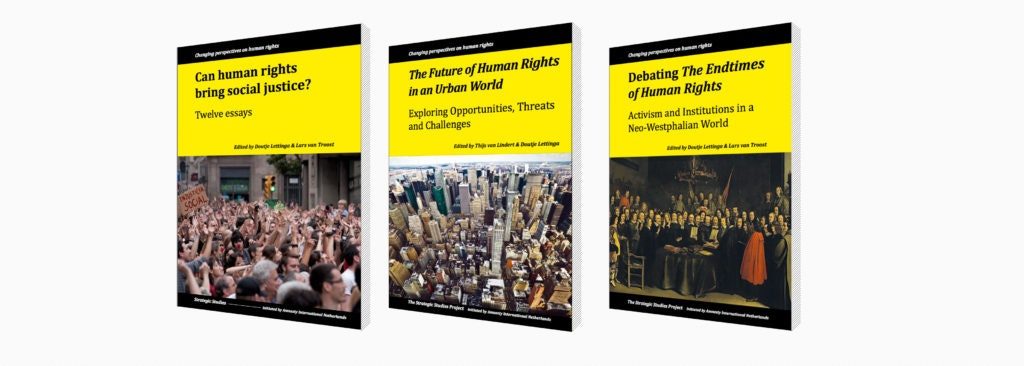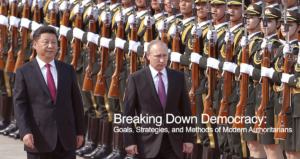 The European Union’s response to Russia’s sham election suggests that it has decided it’s time to cuddle up to dictators, the Carnegie Endowment’s Judy Dempsey observes in the Washington Post.
The European Union’s response to Russia’s sham election suggests that it has decided it’s time to cuddle up to dictators, the Carnegie Endowment’s Judy Dempsey observes in the Washington Post.
Such a craven posture is especially regrettable when an “informal, loose-knit Authoritarian International has emerged to wage political war against democracy,” according to a leading commentator. With Russia as the nerve center, this collection of strongman regimes and dictatorships works to undermine democratic norms, smother civil society, prevent the outbreak of color revolutions, and sow dissension and confusion among the democracies, argues Arch Puddington, Distinguished  Scholar for Democracy Studies at Freedom House, where he edits Freedom in the World, an annual report on global democracy.
Scholar for Democracy Studies at Freedom House, where he edits Freedom in the World, an annual report on global democracy.
Authoritarian powers are willing to tolerate poverty, alienated university graduates, even mass hunger as long as reforms are seen as jeopardizing their political supremacy. Indeed, today’s autocrats understand that pluralism and dissenting ideas pose as serious a threat to their rule as they did to the one-party dictatorship of the previous century, he writes for Amnesty International’s Changing Perspectives on Human Rights series:
They are also convinced that global politics is a zero-sum game, whereby the collapse of any member of the international authoritarian fraternity hands liberal democracy a victory and poses a threat to authoritarians everywhere. No matter how incompetent and unpopular a regime may be – take Venezuela, for example – or how brutal – Assad’s Syria junta – the loose-knit authoritarian international will take whatever steps are required, including direct intervention in some cases, to shore up a faltering and despised leadership. Today’s authoritarians see the world as hostile and are determined to prevail over the West.
 Vladimir Putin may be cynically exploiting a social conservative message to stay in power. That doesn’t mean his message does not have a legitimate appeal—both among Russians and abroad, according to John Lloyd, co-founder of the University of Oxford’s Reuters Institute, and Moscow-based journalist Daria Litvinova, a former department head at RIA Novosti.
Vladimir Putin may be cynically exploiting a social conservative message to stay in power. That doesn’t mean his message does not have a legitimate appeal—both among Russians and abroad, according to John Lloyd, co-founder of the University of Oxford’s Reuters Institute, and Moscow-based journalist Daria Litvinova, a former department head at RIA Novosti.
In an article in the National Endowment for Democracy’s Journal of Democracy in October of last year, the Berkley political scientist M. Stanley Fish wrote that “Putin aims to convey a clear message to the masses in developing societies: ‘My people and I bear no strange moral agenda. We too are offended by Western governments and NGOs who tell us to embrace homosexuality and reject traditional gender roles and identities. Our churches and mosques and temples, like yours, reject imposed liberal immorality. Join us and together we will stand strong for our cultural sovereignty and right to live as we will’,” they write for the American Interest:
Putin, in his time in office, has transformed Russia from an emerging democracy and a potential ally to an entrenched authoritarian, illiberal society with a hostile attitude to the West. The tracks Vladimir Putin has laid down with such care and thoroughness since 2012 are unlikely to be ripped up in his fourth term, in large part because they clearly resonate with a conservative-minded subset of the Russian public. Western liberals ignore this reality at their peril—and would do well to recognize that similar dynamics are at play in their own politics. RTWT
 In the wake of Putin’s coronation, “will the former K.G.B. operative—who for decades was a dedicated servant of the Communist Party and a spy for the Soviet Union—become even more aggressive in trying to unravel the liberal Western order that has dominated the world for decades? And is he stoppable?” the New Yorker’s Robin Wright asks:
In the wake of Putin’s coronation, “will the former K.G.B. operative—who for decades was a dedicated servant of the Communist Party and a spy for the Soviet Union—become even more aggressive in trying to unravel the liberal Western order that has dominated the world for decades? And is he stoppable?” the New Yorker’s Robin Wright asks:
“He is not necessarily a Soviet man, but he is a Cold War man. And he’s a K.G.B. man,” Nina Khrushcheva, the granddaughter of the former Soviet Premier Nikita Khrushchev, reflected at an event at the New School, in New York, last month. “And, for every K.G.B. officer, it was a dream to be known or to be thought of as somebody who can take down American democracy. For him, that image around the world would probably be even more important than this kind of partnership and parity with the United States.”
In a new report, the Carnegie Endowment for International Peace, a Washington-based think tank with a branch in Moscow, warns that Putin’s Russia is now “casting a far broader net and effectively chipping away at the U.S.-led international order,” including methodical spawning of a worldwide propaganda network to challenge the Western order, Wright adds:
Putin’s gains are now tangible. Putinesque candidates did well in recent Italian and German elections, while countries that had left the Soviet orbit—Poland, Hungary, the Czech Republic, and Slovakia—have warmed to Moscow again. Middle Eastern nations—such disparate bedfellows as Israel, Iran, and Saudi Arabia—have far better relations today with Putin’s Russia.

Guardian
“Russia’s more assertive foreign policy is making the Kremlin an important player in an expanding array of countries and regions,” the Carnegie report concludes. Given the disarray in the West right now, Putin will try to further expand his sway. “Where the United States and its allies have pulled back or failed to deliver, Russia has eagerly stepped in.” RTWT
“Despite their considerable strengths, the world’s leading democracies remain on the defensive in the face of the relentless pressure from their global adversaries,” Freedom House’s Puddington observes. “Indeed, only now, with the overpowering evidence of Russian meddling in their internal political affairs, have the democracies come to recognize that there really are hostile forces out there who pose a threat to their interests and values.”
“To actually reverse the current authoritarian surge, the world’s democracies must demonstrate that they are as committed to the triumph of their ideals as Russia, China, and other autocracies are to thwarting them,” he concludes.







